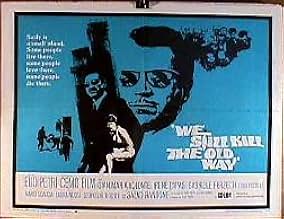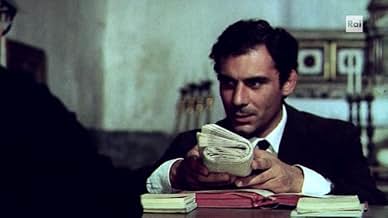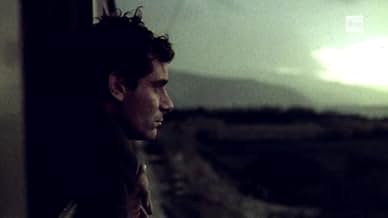Agrega una trama en tu idiomaIn Sicily, a leftist professor investigates the "honor killings" of two friends, uncovering a tangled web involving politicians, the Mafia, the Church, and the widow of one of the victims.In Sicily, a leftist professor investigates the "honor killings" of two friends, uncovering a tangled web involving politicians, the Mafia, the Church, and the widow of one of the victims.In Sicily, a leftist professor investigates the "honor killings" of two friends, uncovering a tangled web involving politicians, the Mafia, the Church, and the widow of one of the victims.
- Dirección
- Guionistas
- Elenco
- Premios
- 6 premios ganados y 2 nominaciones en total
- Dirección
- Guionistas
- Todo el elenco y el equipo
- Producción, taquilla y más en IMDbPro
Opiniones destacadas
This marks the first collaboration between director Elio Petri, writer Ugo Pirro and actor Gian Maria Volonte which was to bear fruit in the extraordinary 'Indagine su un cittadino al di sopra di ogni sospetto' and is loosely adapted from the novel by Leonardo Scascia who was again to provide the source material for Rosi's stupendous 'Cadaveri Eccellenti'.
Scascia's novel was inspired by the assassination of a policeman by the Mafia and here Petri and his cinematographer Luigi Kuveiiller have created a striking contrast between the ravishing Sicilian scenery and the all-pervading corruption although there is perhaps a little too much use made of the 'zoom'.
Excellent script and taut editing with strong performances from Volonte, Gabriele Ferzetti, both of whom were awarded Silver Ribbons, the striking Irene Papas whose role does not really do justice to her talents and a marvellous cameo by Petri regular Salvo Randone as a blind oculist!
Petri's customary Left-leaning social criticism is in evidence here but what should have been a top class film is alas, for this viewer at any rate, weakened by imperfect post-synchronisation and some distinctly dodgy dubbing. The genius of Ennio Morricone is conspicuous by its absence here as the score by Luis Bacalov is intrusive, badly integrated and undermines rather than underlines the film's effectiveness.
Scascia's novel was inspired by the assassination of a policeman by the Mafia and here Petri and his cinematographer Luigi Kuveiiller have created a striking contrast between the ravishing Sicilian scenery and the all-pervading corruption although there is perhaps a little too much use made of the 'zoom'.
Excellent script and taut editing with strong performances from Volonte, Gabriele Ferzetti, both of whom were awarded Silver Ribbons, the striking Irene Papas whose role does not really do justice to her talents and a marvellous cameo by Petri regular Salvo Randone as a blind oculist!
Petri's customary Left-leaning social criticism is in evidence here but what should have been a top class film is alas, for this viewer at any rate, weakened by imperfect post-synchronisation and some distinctly dodgy dubbing. The genius of Ennio Morricone is conspicuous by its absence here as the score by Luis Bacalov is intrusive, badly integrated and undermines rather than underlines the film's effectiveness.
The Elio Petri film is unimpressive though it won the Best Screenplay Award at Cannes. Guess the subject and the story telling were interesting in 1967, Interesting to see Irene Papas in a negative role.
Paolo Laurana is a kind of leftist intellectual who chances to be intrigued by a mysterious double murder in the Sicily of mid Sixties. In his personal detection for murder's instigators, he will run into a plot in which both politicians and mafia racketeers are involved. So curiosity will become a very dangerous affair. Taken from a novel by Leonardo Sciascia (1921-1989), A ciascuno il suo (1967) is a film where high rank acting is at its top. Cast (Gianmaria Volonté, Irene Papas, Gabriele Ferzetti, Salvo Randone, Luigi Pistilli. Mario Scaccia, Leopoldo Trieste) is perfect and well-combined, direction (Elio Petri, 1929-1982) is powerful and impressive. If compared to the novel, Elio Petri's film (written with Ugo Pirro) may seem short of that illuministic pessimism that breathes through Sciascia's books, but Laurana's rationalistic search for truth retains that `bitter taste of intelligence' which is one of the major feature of Sciascia's characters. A key film to understand historical condition of Italy in the Sixties.
Goodish blend of Mafia movie (still pretty much uncharted territory at the time) and political thriller, with a hesitant romance thrown in for good measure; the result is generally absorbing, thanks largely to uniformly excellent performances, gleaming location photography (Sicily, of course) and a wonderful score by the ever-reliable Luis Enrique Bacalov. Heading the cast is Gian Maria Volonte': the film launched the political/social conscience phase of his career after a stint doing Spaghetti Westerns. His character is that of an intellectual loner who finds himself in over his head when he starts probing into the assassination of two friends including philanderer Luigi Pistilli which leads to his falling for the other's wife (Irene Papas). Though the identity of the villain (as ever, an eminent member of the community and far closer to the hero than he envisaged) comes as no real surprise, the investigation involving, among other things, the hushed participation of cleric and senator alike and the disquieting revelations that emerge from it, lends the whole a deeply cynical tone (culminating in the downbeat climax depicting Volonte''s own extreme fate) while cementing the Mafia's reputation as strictly a 'family business'. The Italian DVD includes an interesting half-hour featurette detailing the making and reception of the award-winning film (including the fact that the author of the source novel, Leonardo Sciascia, was dissatisfied with how the script turned out); the interviewees are co-scriptwriter Ugo Pirro, the wife of the late Elio Petri, and composer Bacalov (who is regretful that, given his felicitous working relationship with the director here, the opportunity never arose for another collaboration).
This is a good, solid, beautifully photographed crime thriller. My misfortune was to pick this film to watch the night after watching, Illustrious Corpses. Now that Italian political crime thriller made in 1976 and based upon a book by Leonardo Sciascia is a near faultless classic with deep undertones and a broad scope that is simply a joy to watch. This, it turns out, is another film based upon another book by Leonardo Sciascia from 1967. How much more sensible it would have been to watch this one first. The thing is there is nothing wrong with this film except it is also about too easily explained killings that the lead character sets out to investigate and in the process overturns a hornets' nest, but there is much less action, intrigue and politics. Gian Maria Velonte is excellent as the professor who takes it upon himself to get involved when most people seem not to care. Interestingly this was the film that helped to lift this actor into more 'serious' films, after having made many spaghetti westerns, one of the last being face to Face also from 1967 when he also played a professor.
¿Sabías que…?
- TriviaFilm debut and only film performance of Anna Rivero.
- ConexionesEdited into Lo schermo a tre punte (1995)
- Bandas sonorasPour rêve l'hiver
("A Dream for Winter") (uncredited)
Lyrics by Arthur Rimbaud
Music by Luis Bacalov
Sung by Léo Ferré
Selecciones populares
Inicia sesión para calificar y agrega a la lista de videos para obtener recomendaciones personalizadas
- How long is We Still Kill the Old Way?Con tecnología de Alexa
- Watch the trailer online
Detalles
- Tiempo de ejecución1 hora 39 minutos
- Mezcla de sonido
- Relación de aspecto
- 1.85 : 1
Contribuir a esta página
Sugiere una edición o agrega el contenido que falta

Principales brechas de datos
By what name was A ciascuno il suo (1967) officially released in Canada in English?
Responda

























